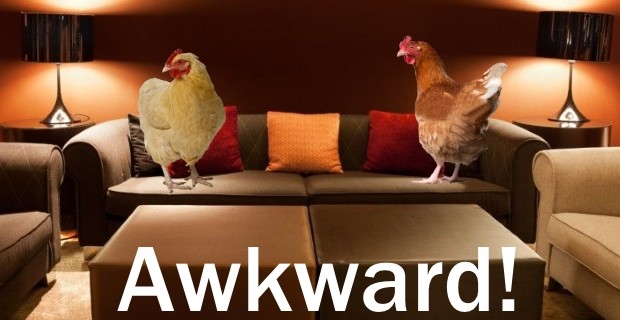Meeting someone for the first time can be awkward. If a new introduction makes YOU nervous, how bad could it be for your chickens? It can’t be as bad as a dating fail like that time you showed off your dancing skills and were asked to leave, you know, because of the dancing or that time you went for the fist pump instead of the hug and kiss, or when you like someone and they just don’t like you ☹
Introducing Chickens
Adding chickens to your existing flock can be troublesome because there is a real chance your current chickens will not accept the new addition at fist or even at all.
The tolerance of your chickens to accept a new addition is hard to predict, it varies from breed to breed and from situation to situation. Adding new chickens is usually considered when you have older birds that have passed on and you would like to add younger birds…however this is the situation most likely to cause problems. The flocks PECKING ORDER has already been established and, in some cases, for many years in the same order. Adding a new chook will most definitely upset this and cause havoc. Ranging anywhere from, chasing the new chook away, ignoring and restricting food and shelter or worse bullying to the point of death.
This is obviously a worst-case scenario, but it also is seriously a high possibility. Just like people, chooks all have different personalities too. Some will get on immediately, some will take time and some not at all.
What can we do to minimize the potential chaos now we have a new chookie?
FIRST OFF IS ISOLATION/QUARANTINE:
Being able to separate the new chickens for an indefinite period will allow the chickens to notice one another. This might mean that you are running two separate chicken coops. Place the new chook in the separation cage/coop closer each day for a few days until both fences are touching. The older chooks will carry on and shout marching orders and rules across the coops, give the new chook some big old stink eyes and will even try peck, chase and kick the newcomer. This is actually normal, establishing the beginnings of the pecking order and in a real life, unsupervised situation the pecking order will still be established just the same.
DISTRACTIONS:
There is plenty of advice on the internet about the best way to introduce new chickens. These range from introducing the new chickens at night, to adding a favourite treat at the same time a new chicken is introduced to playing music and even moon phases. However, in my experience these tactics only delay the inevitable. A pecking order needs to be established and the chooks are going to establish the pecking order no matter what diversionary tactics you use. You will, over the years know when you must isolate first or when you can just say, ok chookies here’s a new friend and monitor. You should NEVER just leave them alone, all together, new and old, with no monitoring, supervision or protection should things go feather up. You have a duty to protect the new chooks as much as the old chooks.
If you are introducing several chickens at the same time, you might think that there are safety in numbers, however what you might find is that all of the attention of the flock is focused on one poor bird who is the centre of this unwanted attention.
A few ideas that will help the situation
1) When you are considering adding a new chicken, introduce chickens of the same breed as your existing flock. They have similar temperaments, and a temperament that you are familiar with. Similar size and age if possible.
2) Very young chicks should not be introduced to older established chickens. At laying age, most breeds aren’t too much smaller than older birds so only introduce birds at or above Point of Lay/Laying age.
3) Make the decision to add chickens early. For example, if you have just setup a chicken coop with 2 chickens and would like more eggs, more times than not you will be able to add another chicken or two within the first few months really without any problems. The longer it is between getting your chickens and then introducing new chickens, the harder it is to add new ones. PECKING ORDER.
The number 1 golden rule
You absolutely need to go into the introduction of new chickens with a plan B.
A plan B might be:
Being able to rehome the new chickens if it doesn’t work out.
HOW WILL I KNOW IF IT IS NOT WORKING OUT:
Oh you will know! New introductions aren’t always easy to watch, in some circumstances your established chickens can be very brutal and can kill the new chicken as mentioned above.
My advice is to make sure you are home and have sufficient time to monitor the situation for the next few days, lessening each week until fully accepted in. However, if there is abnormal bullying and it does not doesn’t subside within a few hours, or the submissive chicken is clearly struggling, then you have to be ready to act. Taking a towel or small blanket and separating the chooks, gently and lovingly remove the bullied chook to a seclusion coop/cage and do not start reintroduction. Instead, rehome.
Also make sure the kids aren’t exposed to any fighting as it can be upsetting.
Blessings to your new chookie
Ras Mark SUBURBAN FARMER

